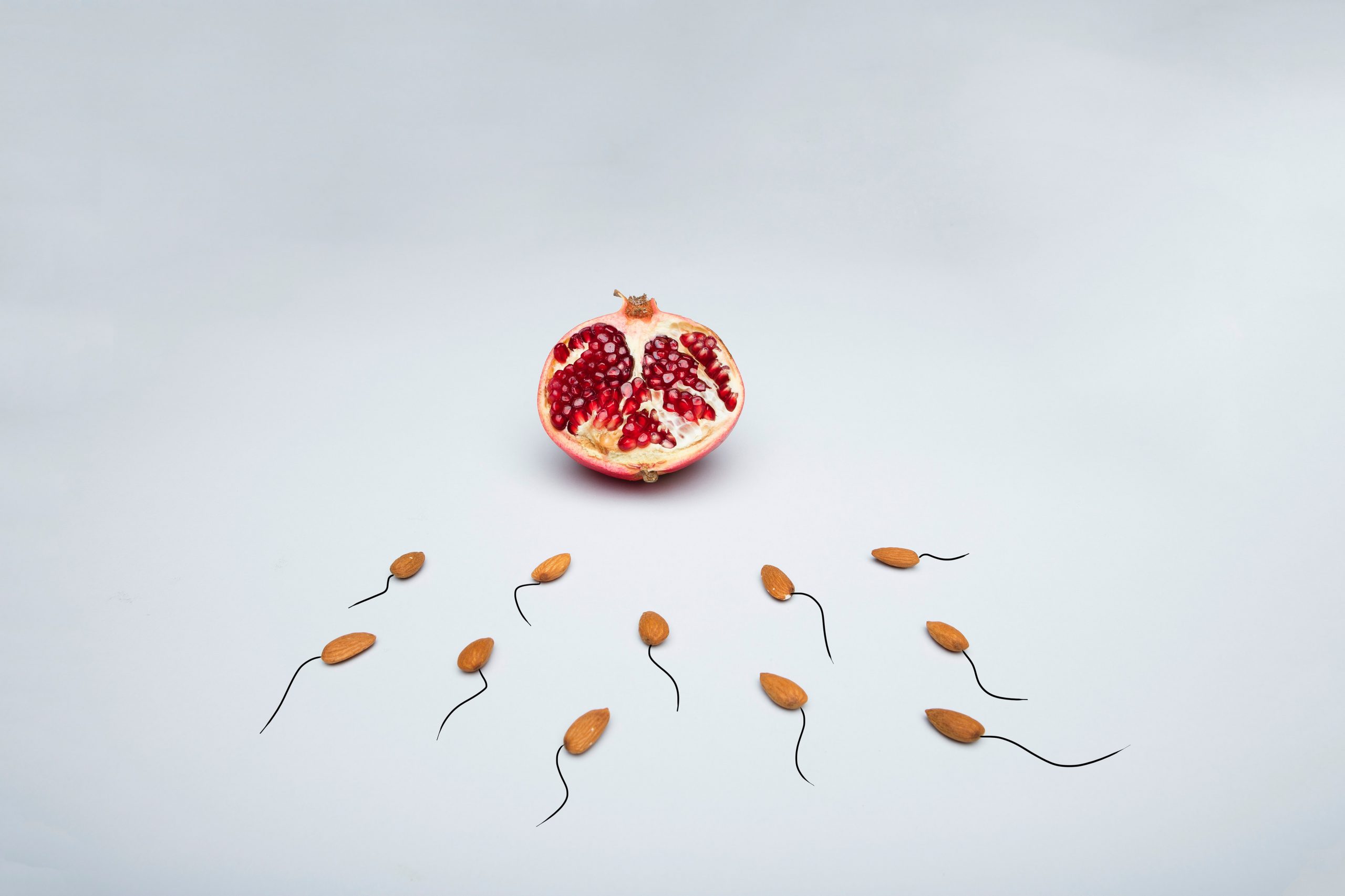Fertility
Resources
Style
Planning
View All
If you are currently pregnant, the journey of sustaining a whole other life in your body probably feels like an extraordinary experience but at the same time, a great deal of responsibility ( in a positive way of course! )
Although there are many aspects relating to the healthy growth and development of the fetus that are beyond our control, one of the main factors that we do have control over is our lifestyle choices- namely our diet.
There are a handful of nutrients that you do not want to be missing out on during your pregnancy to ensure the best possible health outcome for your baby. These include choline, iron, calcium, Vitamin D, iodine, and folate to name a few.
If you recently found out that you are pregnant or are planning on conceiving, you are in luck! Today, Wellspring Nutrition is specifically going to highlight the importance of folate, and how this nutrient can be a powerful ally for preventing a common type of birth defect- the neural tube defect.
What is a Neural Tube Defect?
Neural tube defect is a birth defect that affects the central nervous system of the baby. In a developing embryo, the neural tube is the precursor to their brain and the spinal cord. Neural tube defect occurs when the neural tube does not properly go through the closure process to complete its formation. The two common types of neural tube defect include:
- Spina bifida (swelling or protrusion of spinal cord or fluid in the back)
- Anencephaly (exclusion of a major segment of the brain)
What is folate?
Folate, otherwise known as vitamin B-9, is found in various foods. As they play an important role in the nucleic acid (DNA and RNA) production and amino acid (the building blocks of protein) metabolism, they are crucial to the functioning of cells.
Folic acid is its synthetic form- meaning folate that is found in dietary supplements and fortified foods.
Why folate is important
The need for folate significantly increases during pregnancy especially because the event of a neural tube defect is closely linked to maternal folate deficiency. Inadequate folate intake can lead to a high homocysteine level in the blood, which is considered to be a risk factor for neural tube defect. Homocysteine is an amino acid and as it is broken down by the vitamin B-complexes, having a high level of this usually indicates deficiency in vitamins.
According to a recent study, another risk factor for neural tube development is the lack of DNA repair function. Since folate is crucial to DNA synthesis, folate deficiency can lead to a loss in the integrity of DNA. Thus, the mechanism for DNA repair is going to be negatively impacted. Genome stability is an important aspect of neural development for the embryo, and adequate folate intake is necessary for a properly functioning DNA repair mechanism.
The timing of sufficient folate intake is important to consider. Neural tube formation of an embryo is completed around three to four weeks after conception. This means that anyone trying to conceive should ideally start incorporating folate in their diet as soon as possible, even if pregnancy is yet to be confirmed.
Even if you are reading this much further into your pregnancy, there are still reasons to consume an adequate amount of folate.
Other than lowering the risks of neural tube defects, research shows that sufficient folate intake during pregnancy is beneficial for the neurodevelopment of the child. There is a study that links prenatal folic acid supplementation to a lowering of the risk of Autism Spectrum Disorder (ASD), and advancements to the cognitive, motor and intellectual functions of the child.
What food should I eat for folate?
Although the general recommendation is about 400 micrograms a day, pregnant women are advised to consume about 600 micrograms of folate every day.
Here are some food items that are good sources of folate to help meet this target:
- Beef Liver
- Spinach
- Black-eyed peas
- Chickpeas
- Asparagus
- Brussel sprouts
- Romaine Lettuce
- Broccoli
- Eggs
As you can see, leafy greens, legumes, and liver are the best sources.
Moreover, it is important to note that folate tends to be sensitive to heat and oxygen. Especially for the leafy greens, it is advised to eat them fresh or have them lightly cooked. In a study that compared the folate retention for different food products, for spinach, boiling led to only 49 percent retention of folate. On the other hand, steaming proved to be the best way to preserve folate in vegetables. Another good news is that the same study found that grilling beef for an extended period of time did not result in much loss of folate as well.
Other than foods naturally present with folate, consuming grain products may be helpful as well. This is because starting in 1998, the U.S Food and Drug Administration (FDA) mandated a folate fortification of grain products such as bread, rice, cereal, flour, and pasta.
However, consumption of refined grain products should be limited during pregnancy to prevent significant spikes in your blood sugar levels.

Looking for more support?
Our fertility dietician Anabelle is available for one-on-one consultation and can help you address any of your concerns regarding fertility, pregnancy or hormonal imbalances like PCOS!
References
- “Chickpeas (garbanzo beans, bengal gram), mature seeds, cooked, boiled, without salt.” https://fdc.nal.usda.gov/fdc-app.html#/food-details/173757/nutrients
- “Embryology, Neural Tube.” https://www.ncbi.nlm.nih.gov/books/NBK542285/
- “Folate and Folic Acid on the Nutrition and Supplement Facts Labels.”https://www.fda.gov/food/new-nutrition-facts-label/folate-and-folic-acid-nutrition-and-supplement-facts-labels#:~:text=For%20folate%2C%20the%20DV%20is,consume%20500%20mcg%20DFE%20daily.
- Gao Y, Sheng C, Xie RH, Sun W, Asztalos E, Moddemann D, Zwaigenbaum L, Walker M, Wen SW. “New Perspective on Impact of Folic Acid Supplementation during Pregnancy on Neurodevelopment/Autism in the Offspring Children – A Systematic Review”PLoS One. 2016 Nov 22;11(11):e0165626. doi: 10.1371/journal.pone.0165626. eCollection 2016.PMID: 27875541 PMCID: PMC5119728 https://pubmed.ncbi.nlm.nih.gov/27875541/
- McKillop DJ, Pentieva K, Daly D, McPartlin JM, Hughes J, Strain JJ, Scott JM, McNulty H.“The effect of different cooking methods on folate retention in various foods that are amongst the major contributors to folate intake in the UK diet.” Br J Nutr. 2002 Dec;88(6):681-8. doi: 10.1079/BJN2002733. PMID: 12493090 https://pubmed.ncbi.nlm.nih.gov/12493090/
- “Pregnancy diet: Focus on these essential nutrients.”https://www.mayoclinic.org/healthy-lifestyle/pregnancy-week-by-week/in-depth/pregnancy-nutrition/art-20045082
- Smith A, Colleen A, Spees C. “Wardlaw’s Contemporary Nutrition, 12th Edition.” McGraw Hill, 2022.
- Wang X, Yu J, Wang J.“Neural Tube Defects and Folate Deficiency: Is DNA Repair Defective?” Int J Mol Sci. 2023 Jan 22;24(3):2220. doi:10.3390/ijms24032220. PMID: 36768542 PMCID: PMC9916799 https://pubmed.ncbi.nlm.nih.gov/36768542/

Oatmeal contains high levels of minerals, such as magnesium and zinc, in addition to fiber and B vitamins. This makes it a great food option if you are struggling with PCOS. Oatmeal can be your quick fiber-rich breakfast, an afternoon snack or eaten really anytime of day! The ingredients are minimal, and you probably have them in your pantry already. It’s a win-win.
Which type of oats is best for PCOS?
The less processed it is the better! Instant oatmeal is the most processed form of oats. Then it’s old fashioned oats and lastly steel cut oats. Steel cut oats have a sharper texture than old fashioned oats that some people don’t enjoy. If it’s your preference, old fashioned oats would still be a healthy choice!
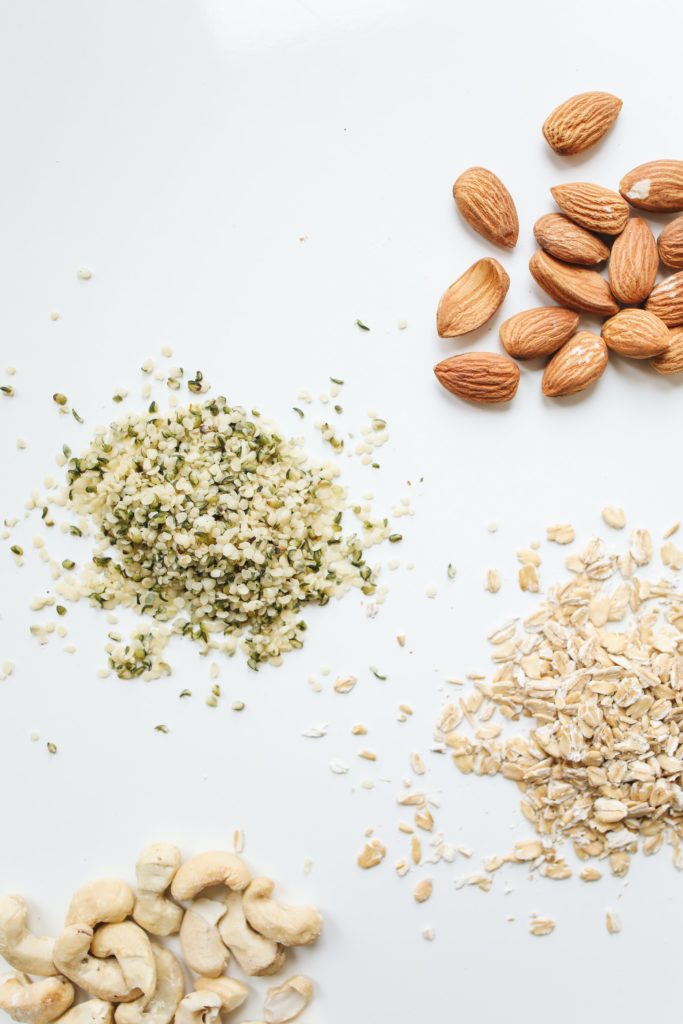
Which breakfast is best for PCOS?
The best breakfast for PCOS is well balanced with lean protein, healthy fats, and whole grains/complex carbohydrates. As a bonus you could even add in some veggies, like if you were having a smoothie or eggs.
Examples of lean protein choices for breakfast include:
- Eggs
- Nut butter (peanut, almond, etc.)
- Nuts and seeds (chia seed, ground flaxseed, etc.)
- Greek yogurt
- Leftover fish or chicken — Hey, who says breakfast has to be “breakfast food”? 😉
- Tofu
- Some plant-based milks with protein like Ripple
Healthy fats such as polyunsaturated and monounsaturated fats are also important in helping us to feel full. These fats give us energy to start the day off right! We can get these healthy fats from foods such as salmon, sardines, avocado, nuts (walnuts, pistachios) and seeds (for example chia and ground flaxseeds).
And last but not least, don’t forget the healthy carbs! Most women with PCOS think they have to avoid carbs and this is simply not true. Fruit, whole grains/complex carbohydrates are considered healthy carbs.
Best fruit choices for PCOS:
- Whole, fresh fruit – all kinds!
- Frozen fruit
- Most of the time frozen fruit does not have added sugar. So there is nothing wrong with eating frozen fruit.
- Dried fruit without added sugars
- Double check the nutrition facts label and try to avoid dried fruit with sugar.
- If it does have sugar remember this quick tip: Keep total added sugars under 25 grams per day for women.
Examples of whole grains/complex carbs for breakfast include:
- Whole grain bread or English muffin
- Oatmeal
- High fiber, low sugar cereal
- Low sugar granola
- Plantains/potatoes
Best Oat Recipes For PCOS

Chocolate Peanut Butter Cup Oatmeal:
1/4 cup rolled oats
1/2 cup unsweetened nut milk
1 tbsp all-natural peanut butter
1 serving chocolate protein powder
2 tsp ground flax seeds
1 tsp chia seeds
sea salt to garnish
Instructions:
Mix oats, flax seeds, chia seeds and nut milk in a bowl.
Microwave for 1-2 minutes
Stir in peanut butter and protein powder.
Top with a sprinkle of sea salt.
Looking for more Support?
Be sure to check out our Free Live Masterclass all about the top 3 ways to naturally enhance your fertility (perfect for those struggling with PCOS and hormone imbalances!)

Is gluten and dairy-free good for PCOS? What’s the best diet for me? Maybe you’ve had these same 2 questions swirling around in your head and you are struggling with the right choice. Wellspring Nutrition is here to help clear the confusion!
Is dairy free better for PCOS?
The answer is “Not, exactly”. If you struggle with PCOS and are also trying to get pregnant, full-fat dairy such as Greek yogurt or milk is a better option for you.
These two foods provide healthy carbs and a good amount of protein. Here’s a study showing how the intake of full fat dairy may decrease risk of infertility. On the other hand foods like ice-cream or processed cheese (like American cheese) should be limited because they provide less nutrition.
Women with PCOS can eat moderate amounts of dairy products while also including a balanced diet of other nutrient-rich foods and still see improvement in symptoms. If you choose to eliminate dairy, it is best to discuss this with a dietitian to make sure you are still getting calcium and vitamin D. Non-dairy sources of calcium include tofu, canned sardines or salmon, tahini, dark leafy greens and some non-dairy beverages that state calcium is included.
Does gluten make PCOS worse?
There is a lack of scientific evidence that supports a gluten free diet for PCOS. It’s important to know that there can be a downside to following a gluten free diet if you don’t need to. As a Registered Dietitian and Fertility Expert I want to help make things easier for you. So if you don’t have a gluten allergy or intolerance then it likely isn’t necessary for you to follow a gluten free diet for PCOS.
Removing gluten means not eating nutritious whole grains and possibly missing out on getting enough fiber, iron and B vitamins. Eating whole grains has been shown to reduce the risk of heart disease and diabetes. So let’s make this easy! Keep on reading for how I can help you.
What should I eat if I have PCOS?
Let’s review some very important foods that’ll help decrease your symptoms.
Fruit
Choose a variety of fresh, whole fruit to enjoy. Frozen fruit is a great option! Fruit (and dairy) contain natural sugars that also come with important nutrients like vitamins and minerals. Added sugars such as white sugar, brown sugar, syrup or agave nectar have no additional nutrients like vitamins and minerals. Added sugars are what we want to limit in our daily food choices.
Some women with PCOS are told they can’t eat fruit because of the sugar content – but that’s simply not true! Fruit has important phytonutrients and antioxidants that help decrease inflammation.
It’s just important to pair your fruit (and carbs) with a source of protein or fat.
For example:
Apple + Peanut Butter
Banana + Almond Butter
Nectarine + Cottage Cheese
These small changes will help you balance out your blood sugar, which will then help balance your hormones.
Here are the daily recommendations for added sugars. Keep total added sugars under 25 grams per day for women and under 36 grams per day for men.
Vegetables
Choose a variety of vegetables and eat them daily. There is no one vegetable that’s better than another. Just like fruit, vegetables have important nutrients like vitamins and minerals. Both fruit and vegetables also have fiber, which is important for managing PCOS. A symptom of PCOS can be insulin resistance. In the simplest of terms this means we want to increase the amount of fiber we eat to improve blood sugar control. This in turn helps with insulin resistance and managing PCOS.
It’s recommended that women up to 50 years of age eat 25g of fiber per day. But, more than 90% of women fall short of meeting the recommendations for fiber.
Try tracking your fiber intake for a few days to see how you stack up compared to the daily recommendations!
Protein & Healthy Fats
Including protein with every meal and snack can be very beneficial for PCOS. Protein helps us to feel full and satisfied between meals. This is important so that we avoid overeating and mindless snacking throughout the day. Both of these two things can help maintain a healthy weight.
Examples of good protein choices include lean meats (fish, poultry, lean beef or pork), tofu, beans, lentils, nut butters, eggs, nuts and seeds.
Healthy fats such as polyunsaturated and monounsaturated fats are also important in helping us to feel full and give us energy. We can get some of these healthy fats from fish such as salmon, sardines, avocado, nuts (walnuts, pistachios) and seeds (for example chia and ground flaxseeds).
Whole grains & starchy vegetables
Whole grains and starchy vegetables are considered healthy carbs. They can also be a significant source of fiber. Fiber helps us to feel fuller longer and so it is a great weight management tool. It’s recommended to eat the skin of white potatoes whenever you have them because that’s where a lot of the fiber comes from. White potatoes also have potassium which is important for our blood pressure.
Examples of whole grains: brown rice, wild rice, quinoa, whole grain bread products
Examples of starchy vegetables: potatoes (sweet and white potatoes), green peas, plantains, yucca, and corn.
Are there foods I should limit?
While there are many foods you can eat, you also want to be aware of foods to limit. This simply means we should enjoy them occasionally. We don’t necessarily want to make them daily food choices.
Added sugars
The number one culprit of added sugars in the American diet is still sugar sweetened beverages like soda, energy drinks and even sports drinks. As previously mentioned, keep total added sugars under 25 grams per day for women. Instead try adding fruit, sliced cucumber and/or mint leaves to water.
Saturated fat
Major sources of saturated fat are fried foods, ice cream and desserts. These foods are more like a treat and should be limited.
Processed foods
Processed foods contain very little nutritional value. You’ll also want to watch for eating too many low-fiber foods like white bread, white rice. It’s not that you can never eat them, but if it’s all you eat then we want to think about expanding our food choices. To best manage PCOS we want a healthy diet full of fruit, vegetables, healthy fats, protein and fiber from healthy carbs (whole grains/starchy vegetables).
Other considerations for managing PCOS
Some of our best non-food tools for managing PCOS include exercise, adequate sleep and stress management. We know how hard it can be to exercise throughout the week! You might be thinking, “it’s impossible”, but even small spurts throughout the day add up. For example, if you are able to walk 15 minutes twice per day that’s already 30 minutes!
The recommendations for exercising are 30 minutes 4-5 days out of the week and can help manage symptoms. You can also incorporate strength training two days out of the week.
There is a possible link between stress and higher BMI in women with PCOS. If you are having a hard time managing stress, consider stress reduction strategies like deep breathing, yoga, journaling and yes even exercise. For more, check out this article on “10 Ways You Can Relieve Stress Right Now”.
Research shows that sleep helps to regulate our cardiovascular, immune system and metabolism. Sleep is an important part of being and staying healthy. According to the Sleep Foundation, 7-9 hours of sleep is recommended for ages 18 and up.
Looking for more Support?
Be sure to check out our free live masterclass all about the top 3 ways to naturally enhance your fertility (perfect for those struggling with PCOS and hormone imbalances!)
References:
- Chavarro JE, Rich-Edwards JW, Rosner B, Willett WC. “A prospective study of dairy foods intake and anovulatory infertility.” Hum Reprod. 2007 May;22(5):1340-7. doi: 10.1093/humrep/dem019. Epub 2007 Feb 28. PMID: 17329264.
- Dietary Guidelines for Americans 2020-2025, https://www.dietaryguidelines.gov/food-sources-calcium
- “Gluten-Free Diet: Is It Right for Me?”
- “Added Sugars” https://www.heart.org/en/healthy-living/healthy-eating/eat-smart/sugar/added-sugars
- Dietary Guidelines for Americans 2020-2025, https://www.dietaryguidelines.gov/sites/default/files/2021-03/Dietary_Guidelines_for_Americans-2020-2025.pdf
- The Sugary 6 Infographic, https://www.heart.org/en/healthy-living/healthy-eating/eat-smart/sugar/sugary-six
- “Polycystic Ovarian Syndrome”, https://www.eatright.org/health/pregnancy/fertility-and-reproduction/polycystic-ovarian-syndrome
- “Basu BR, Chowdhury O, Saha SK. Possible Link Between Stress-related Factors and Altered Body Composition in Women with Polycystic Ovarian Syndrome.” J Hum Reprod Sci. 2018 Jan-Mar;11(1):10-18. doi: 10.4103/jhrs.JHRS_78_17. PMID: 29681710; PMCID: PMC5892097.
- “10 Ways You Can Relieve Stress Right Now”, https://health.clevelandclinic.org/how-to-relieve-stress/
- “How Much Sleep Do We Really Need?”, https://www.sleepfoundation.org/how-sleep-works/how-much-sleep-do-we-really-need

Ever wondered what steps you should take to optimize your nutrition before starting IVF?
Well wonder no more!
Here are 3 steps to preparing for your IVF journey
1.Take the time to optimize your lifestyle with your partner, whoever they may be!
It is important to keep in mind that dietary and lifestyle changes don’t happen overnight. Did you know that it takes approximately 3 whole months for both your eggs and sperm to fully mature? This really highlights why it is so important to spend at least 3 months prior to your first cycle of IVF making any required changes to your diet and lifestyle.
This may include:
- Optimizing your diet (I’ll go into more detail later in this blog post).
- Understanding your cycle. Speak to your fertility specialist or dietitian about your current menstrual cycle and ovulation. There are likely several strategies you can undertake to optimize and balance your cycle.
- Start or maintain a healthy, exercise routine. The current physical activity guidelines for adults state that you should aim to get at least 150-300 minutes of moderately intense exercise each week or 75-150 minutes of vigorous exercise each week for optimal health.
- Take steps to reduce your stress. Studies have repeatedly shown that chronic stress increases the level of inflammation in our body which increases oxidative stress and subsequent damage to the quality of our eggs and sperm. See my previous blog post for tips on how to reduce your stress!
2. Increase your consumption of dietary antioxidants!
One way you can do this is to adopt a Mediterranean-style diet. This pattern of eating has numerous benefits (particularly when it comes to fertility and IVF!).
It has been shown to:
- Improve both egg and sperm quality
- Increase embryo yields when you are undergoing IVF treatments
- Optimize fertility outcomes
- Enhance pregnancy outcomes (encourages carrying a healthy baby to full term with no complications)
- Decreases inflammation in the body thus improving both egg and sperm quality and increases the likelihood of conception
So what does a Mediterranean diet look like?
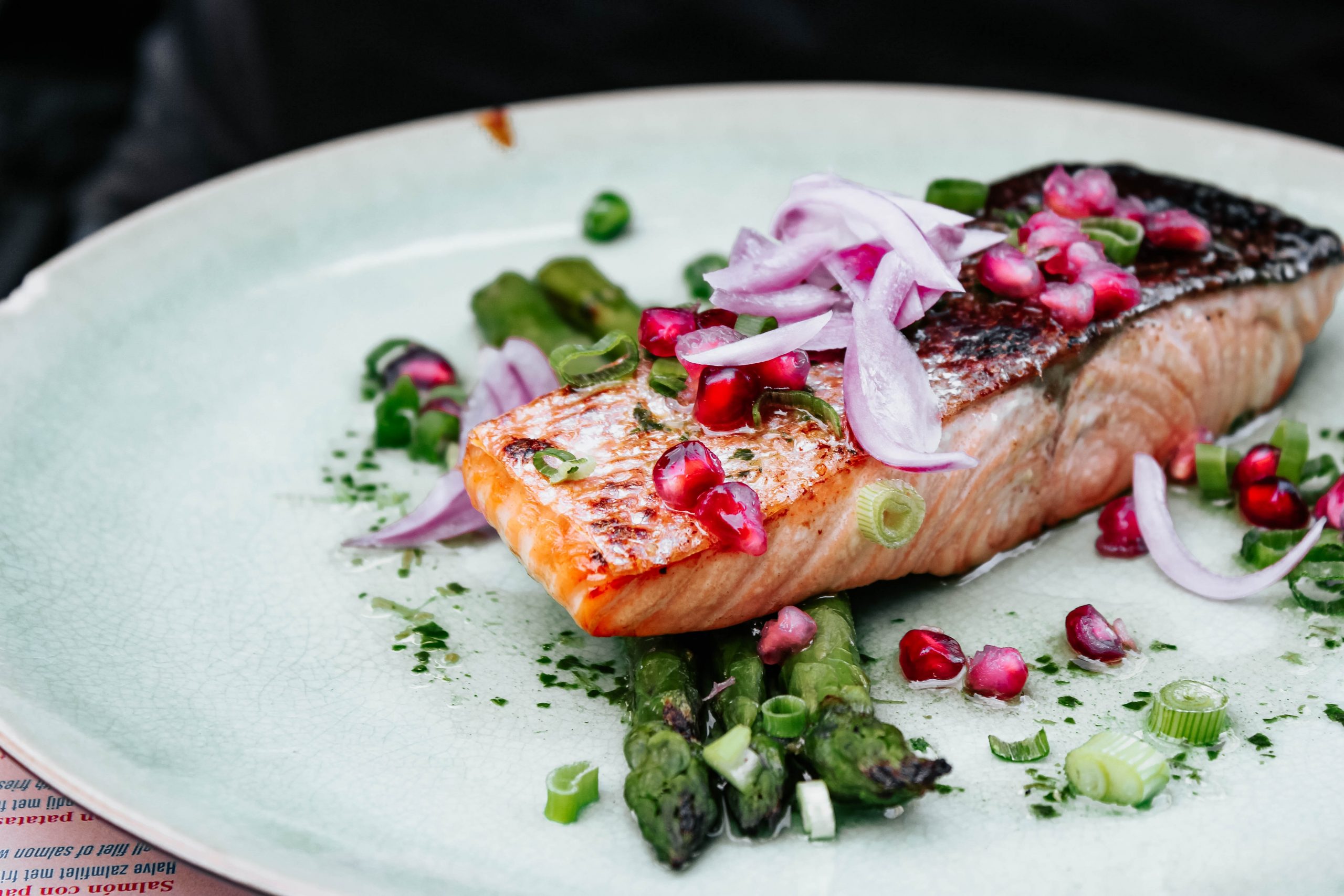
- Consuming plenty of colourful fruits and vegetables every day. A simple way to achieve this is to aim for at least 3 different colors on your plate at every meal!
- Consuming wholegrains (breads, cereals, rice, quinoa etc.)
- Cooking and using healthy fats like extra-virgin olive oil
- Eating a variety of different nuts and seeds
- Including legumes/beans in your diet (think of them like a vegetable with protein!)
- Plenty of seafood (with a particular emphasis on oily fish) at least twice each week
- Moderate consumption of dairy foods, eggs, and poultry (chicken, duck, turkey)
- Limiting your consumption of red meat
A Mediterranean style diet will ensure that you get all of the below nutrients that studies have shown are essential for quality eggs and sperm.
- Omega-3 fatty acids
- CoQ10
- Zinc
- Vitamin D
- Selenium
- Folate
- Vitamin E
- Vitamin C
- Lycopene
Studies have also shown that the wholegrains in a Mediterranean-style diet will aid the implantation of your fertilized egg!
3. Get a tailored supplement plan!
There are many ways that nutritional supplements can improve your chances of conceiving during IVF. However, it’s not as simple as taking your average prenatal.
A tailored supplement plan will take into account several factors including your:
- Age
- Medical history
- Reproductive history
- Current oral intake
- Weight and height
This will mean that you are taking supplements that have been individually tailored for your specific needs!
If you would like to learn how to optimize your nutrition before starting IVF, schedule your free 30 minute 1:1 strategy call with me!

References:
1.Mediterranean Diet 101: Meal Plan, Foods List, and Tips (healthline.com)
2. Maternal whole grain intake and outcomes of in vitro fertilization (nih.gov)

One of my favorite parts about working in functional nutrition is that I get to take a deeper dive into the root causes of health issues. Fertility is something that is so interconnected to every system in the body, that we sometimes forget that something that may seem totally unrelated, could actually be the root of everything else. That’s why I’m excited to talk about how gut health specifically impacts fertility.
he gut impacts your entire body – from modulating risk for chronic diseases like heart disease, diabetes, and cancer, to impacting your mood, anxiety and depression. There is A LOT of research happening these days around gut health, and there’s more coming out every day about how the gut microbiome impacts fertility.
What is the Microbiome?
So first, let’s talk about what the gut microbiome actually is. The gut microbiome is essentially all the bacteria that live inside your digestive system, specifically the large intestine. In the gut there are 100 trillion bacteria cells – more cells than our body’s own cells!
While there can certainly be bad bacteria that cause infections and disease, there’s also a whole host of beneficial bacteria that work hard to digest and absorb our food, signal neurotransmitters to our brains, fight inflammation and boost immunity.

The microbiome impacts:
- Energy levels
- Mood, stress and brain health
- Digestive health
- Immune function
- Skin health
- Inflammation
- Weight
- Hormones
Keeping our microbiome happy is essential for almost everything else happening in the body! The problem is, for many of us our gut balance between good bacteria and bad bacteria is way off. Whether you’re having obvious digestive symptoms (gas, bloating, constipation, diarrhea, etc.), or something else is going on in your body – you likely need to take a closer look into the health of your microbiome.
5 Ways Gut Health Impacts Fertility
One of the most clear connections between the health of your microbiome and fertility, is through the regulation of sex hormones, namely estrogen.
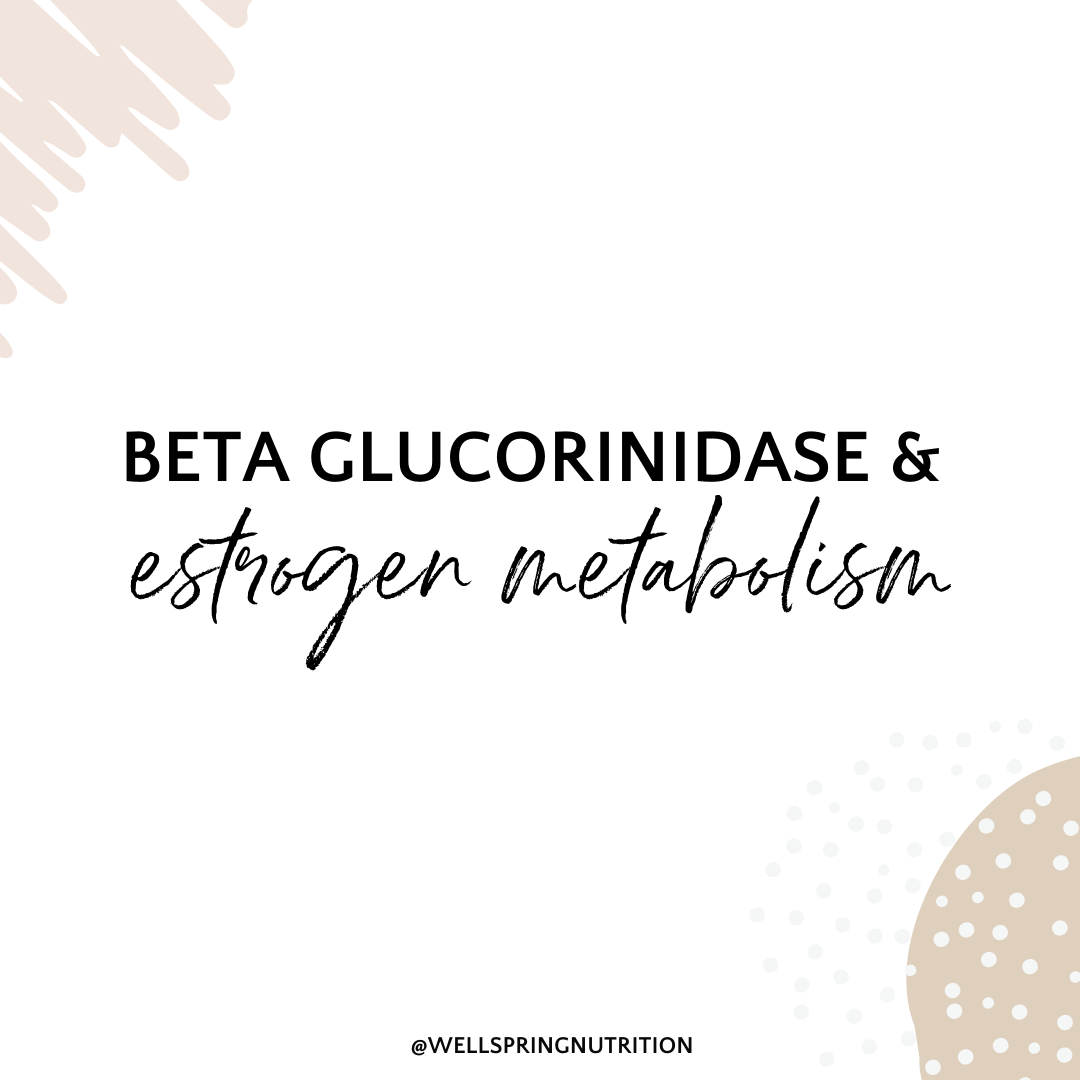
Gut Health and Hormone Balance
Estrogen is a hormone that the body makes, uses and then needs to get rid of. It goes through three phases of detoxification to be able to remove it from the body. The last step in the process is controlled by the gut microbiome.
There’s an enzyme in your large intestine called Beta glucuronidase, and it’s responsible for unpacking estrogen and allowing to it be re-circulated and re-absorbed in the body.
When you have high levels of B-glucuronidase, it’s usually a sign that you likely have excess estrogen in your body (estrogen dominance) and may have even experienced some of these symptoms, like menstrual cycle problems, painful periods, heavy bleeding, etc.
Signs of Estrogen Dominance:
- Mood swings/mood instability
- Water retention
- Difficulty losing body fat
- Acne and skin issues
- Irregular periods or anovulatory cycles
- Painful cycles
- Low sex drive
- Difficulty building lean muscle mass
- Poor recovery from exercise
- Sleep issues
When our bodies can’t eliminate excess estrogen through the GI tract it actually impairs fertility because it throws off the ratio between estrogen and progesterone, and ultimately causes a higher risk for miscarriage.
Remember, any dysbiosis prior to pregnancy is also going to worsen during pregnancy, so it’s a good idea to work on your gut health prior to conceiving.
According to a recent review, without a healthy microbiome, estrogen metabolism and function becomes impaired and can lead to a number of health consequences including endometriosis, PCOS, endometrial hyperplasia, and infertility.
Authors of this review concluded that treating the gut microbiome to modulate estrogen levels should be considered as a new future treatment for estrogen-mediated diseases including infertility.
Gut Health and Weight
The gut microbiome has been associated with higher pre-pregnancy weight as well as more weight gain during pregnancy. We know that excess weight impacts fertility, and researchers have found that those who are overweight have a different microbiome, with different types of bacterial strains than their normal weight counterparts.
There’s evidence that higher calorie diets rich in sugar and processed foods actually skew the balance of microbes. In fact, a recent study showed that the diversity of these microbes can be influenced by diet within just 24 hours!
Diets based in fruits, vegetables and plenty of fiber support the microbiome, whereas the Standard American Diet (SAD) has been shown to be detrimental to the microbiome.
Gut Health and Thyroid
As mentioned earlier, when there is an imbalance in the microbiome, it impacts immunologic and metabolic functions. A study in 2015 found that hypo- and hyper-thyroidism was associated to small intestinal bacterial overgrowth (SIBO), and another study in 2019 found an association between dysbiosis and thyroid cancer and thyroid nodules.
Since your thyroid health is so important for not only all metabolic function, but also fertility, it’s important to take this into consideration.
An under-active thyroid can impact fertility in a few different ways:
- Decreased cellular energy – meaning less mitochondria (your cell’s powerhouse) on ovarian cells, causing irregular or absent cycles.
- Increased prolactin – which suppresses ovulation by blocking the release of FSH
- Decreased insulin sensitivity – more insulin in the blood increases androgens, which can disrupt ovulation and is especially detrimental for women with PCOS
Gut Health and Inflammation
You don’t need to have inflammatory bowel disease to have inflammation in the gut, or your gut causing inflammation in other parts of the body. For example, if you have intestinal permeability (aka “leaky gut”), there could be bacterial products entering the blood stream, causing your immune system to attack them and cause chronic inflammation.
Since inflammation is linked to so many chronic diseases and infertility, this is an important link to consider.
Gut Health and Pregnancy Complications
Research has shown the poor gut health was associated with higher risk of preeclampsia, gestational diabetes, and preterm birth. The microbiome has also been looked at for infant health and studies have shown a connection between imbalances in the microbiome with increased risk of eczema, asthma, and allergies. A healthy microbiome will also contribute to your baby’s immune function, inflammation, and healthy weight throughout their life.
How Do I know if I need Help with my Gut Health and Fertility?
So by now I’m sure you’re convinced that gut health plays a major role in fertility. But how do you know if taking a daily probiotic is enough? Ask yourself:
- Have I been suffering with digestive issues for years (this is just my new “normal”)
- Do I often fluctuate between feeling constipated or having loose stools?
- Are there foods that I avoid because I can’t tolerate them?
- Do I have frequent acid reflux?
- Do I have signs of estrogen dominance? (heavy period, PMS, excess weight and weight loss resistance, etc.)
If you answered yes to any of these questions or you just feel that it’s time to take a closer look into your gut health, then set up a free discovery call with me to see how functional nutrition can help you on your fertility journey.
And let me know in the comments below what was surprising for you about this blog post!
References
- https://www.ncbi.nlm.nih.gov/pubmed/28778332
- https://www.ncbi.nlm.nih.gov/pubmed/25564410
- https://www.ncbi.nlm.nih.gov/pmc/articles/PMC4216449/
- https://www.ncbi.nlm.nih.gov/pmc/articles/PMC4137456/
- https://www.ncbi.nlm.nih.gov/pmc/articles/PMC4845518/
- https://www.ncbi.nlm.nih.gov/pmc/articles/PMC2701523/
- https://www.ncbi.nlm.nih.gov/pubmed/28388917
- https://www.ncbi.nlm.nih.gov/pubmed/30584647
- https://link.springer.com/article/10.1007%2Fs12020-014-0509-2
- https://www.ncbi.nlm.nih.gov/pubmed/32070720
- https://www.ncbi.nlm.nih.gov/pubmed/32064643
- https://www.ncbi.nlm.nih.gov/pubmed/32063084
One of the best ways to start prepping for pregnancy and optimizing your fertility, is to become more aware of your sex hormones like estrogen, progesterone, and testosterone. If you’ve been tracking your cycle for a while now, you may know that there are two distinct phases of the cycle – your follicular phase and your luteal phase.
Many women experience issues in their luteal phase, which is connected to the hormone progesterone. In this blog, we’ll cover in depth what progesterone is, how to measure it, and what you can do to improve progesterone levels naturally.

What is Progesterone?
Progesterone is a steroid hormone made from cholesterol, and is made from luteine cells in the uterus. These cells will make progesterone until the placenta is strong enough to make progesterone on it’s own, and will continue to do so for the rest of pregnancy.
We make progesterone for about 2 weeks during the luteal phase after ovulation.
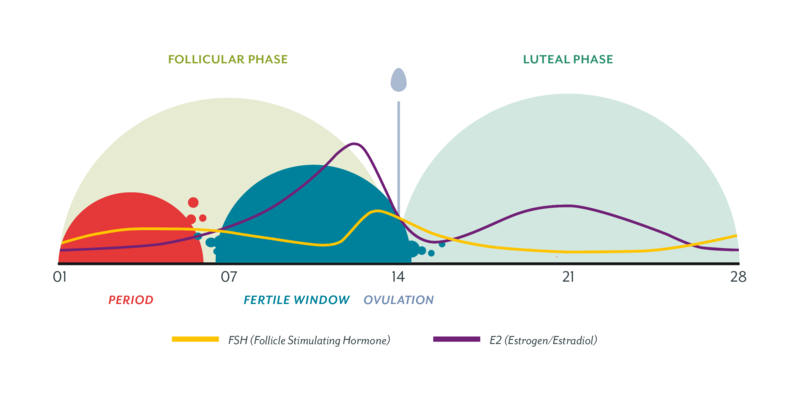
The follicle turns into the corpus luteum (aka yellow body), which is what makes progesterone. Your body does not make progesterone in the first half of your cycle.
The first half of your cycle (your follicular phase) is where estrogen is released. You need that rise in estrogen to ovulate, and then progesterone kicks in.
So why is this important for fertility?
Progesterone is your pro-gestation hormone. It helps grow a baby in your uterus and thrive there. When progesterone is made, it’s made for the first 8-10 weeks from the corpus luteum, at which point the placenta should be strong enough to take over.
However, for some women their corpous luteum is not strong enough to make progesterone last for 8-10 weeks, which often leads to early pregnancy loss. Having a healthy amount of progesterone plays a large factor in preventing miscarriage.
The problem is, many fertility clinics will test progesterone from a blood draw on one day of the cycle, but the levels of progesterone can change dramatically throughout the day (and month). Additionally, many women don’t know that they need to check their progesterone levels in the second half of the cycle – this is KEY!
One way to check progesterone levels at home is by using progesterone test strips, like the Proov test strips – which will tell you if you have healthy levels of progesterone after ovulation.
In addition to helping to prevent miscarriage, progesterone is important for priming the uterine lining for implantation.
When should levels be measured for progesterone?
If you’re working with a fertility clinic, it’s important that you check your progesterone levels in the second half of your cycle. Remember, you don’t make progesterone in the first half of your cycle.
Ideally, you would check progesterone levels 5-7 days after ovulation. If you ovulate on day 14, then you want it on day 19-21 to measure, before the start of your period.
While a serum test can be helpful, a DUTCH test provides more information because it measures progesterone at 4 different points throughout the day and takes the average.
[If you’re interested in taking the DUTCH test and having your labs interpreted by me, schedule a call below to chat!]

Because progesterone will be vastly different at different times of the day, it’s best to get a reading at different parts of the day for the most accurate picture of your progesterone levels.
Additionally, progesterone can be made on certain days but then can putter out very quickly. Some signs of low progesterone could be tender breasts, PMS symptoms, and heavy periods.
What are Optimum Serum Levels of Progesterone?
Ideally, serum levels are above 10. Lower numbers are indicative of a weak corpus luteum, and if your levels are extremely low, it could be that you’re not ovulating at all, and rather progesterone is being made from the adrenals glands, and not the ovaries at all.
SIGNS OF LOW PROGESTERONE:
- PMS – mood changes, bloating, tender breasts
- Heavy periods, clotting, worse endometriosis symptoms
- Insomnia and stress or anxiety before period (progesterone impacts GABA, a neurotransmitter that calms things down)
- Spotting before period (losing the uterine lining that you’re supposed to maintain)
- Short luteal phase (should be 12-14 days ideally, anything shorter can be a sign of low progesterone)
Suggested Reading: How to Find Your Fertile Window
Remember, hormones are not just about reproduction – hormones impact the cardiovascular system, brain health, immune system, gut health, and essentially every system in the body!
What You Can Do to Increase Progesterone
Okay, so now that we know progesterone is important, and perhaps you’ve noticed signs of low progesterone either from a test, or symptoms mentioned above – what can you do about it?

1. Manage your stress levels
When you have a lot of stress, whether or not it’s real stress or perceived stress – your body will react in the same way.
Cortisol, epinephrine and norepinephrine will feed back to the brain and let your brain know that there’s a lot of stress here.
The brain will then decrease signaling of estrogen and progesterone. Women will first lose progesterone, which will cause you to not ovulate. If the stress is strong enough, then it will down regulate FSH and estrogen, and you will have amenorrhea and skip cycles completely.
This is your body’s way of protecting you. If you’re being chased by a tiger (stress), it’s probably not a good time to make a baby. So working on self care, and anything to support your body like good sleep, healthy relationships, regular movement, etc. is going to be helpful in managing stress, but also in making enough progesterone.
Of course, if you’re trying to conceive or in the middle of fertility treatments, you’re likely very stressed. It’s not helpful for me to tell you that you just need to stop stressing, but understanding the biochemistry behind how stress impacts ovulation and progesterone can give you a better understanding of how your lifestyle choices are impacting fertility.
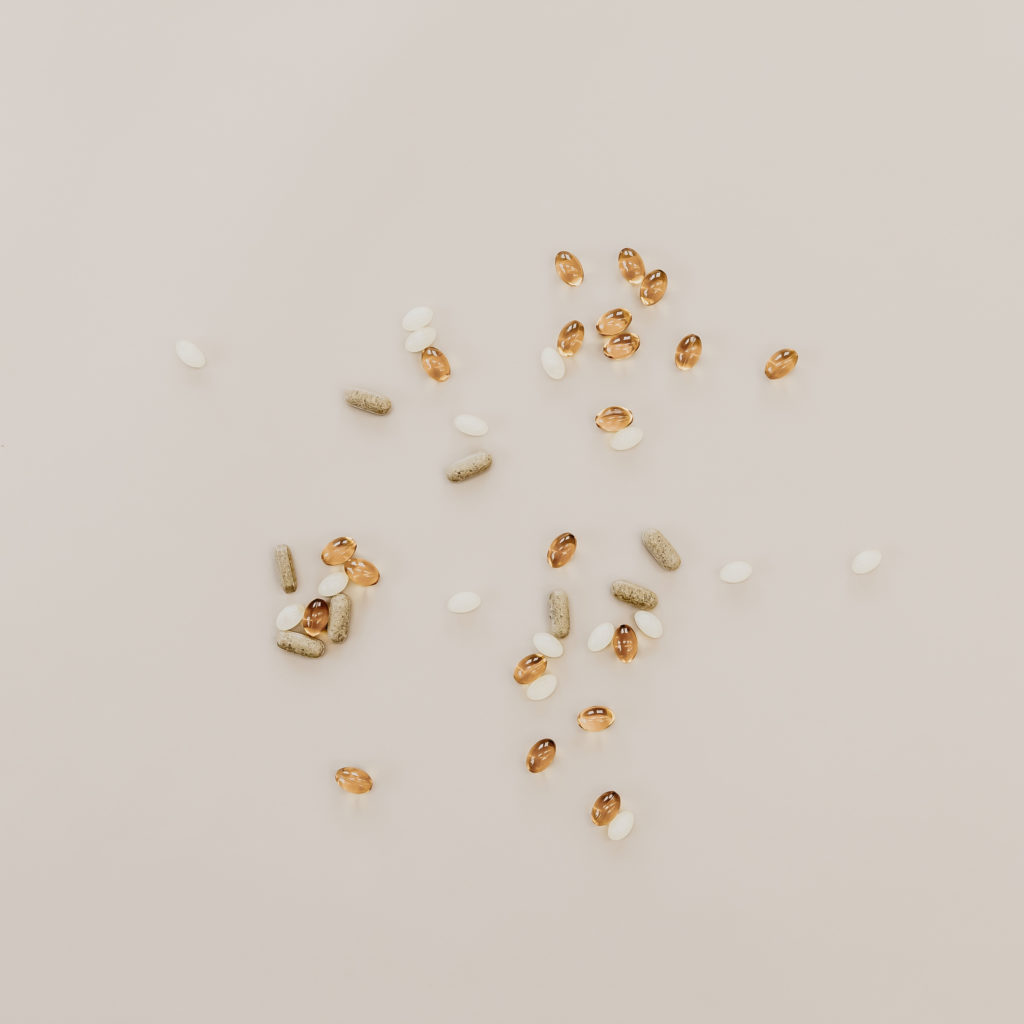
2. Work on Your Gut Health
Your immune system starts in the gut, and any inflammation happening there will negatively impact progesterone production as well.
Whether you are taking a comprehensive stool test, or just taking the 5R approach to gut health – taking care of your digestion will help balance out your hormones in the long run.

3. Stop Under-Eating and Over-Exercising
As a reminder, all steroid hormones are made from cholesterol. If you have very low levels of cholesterol you may be not be able to make sex hormones like estrogen and progesterone.
Additionally, leptin (a hormone made from fat tissue) is a big sign for fertility -it will tell your brain if you have enough fat on you to actually carry a pregnancy term.
If you’re a marathon runner, extreme athlete, have an active eating disorder, or just really cutting calories and over-excerising and have a very low body fat percentage, your cycles will stop or skip in order for your body to reduce your chances of getting pregnant.
HOW TO BALANCE PROGESTERONE THROUGHOUT THE CYCLE
If you’re having troubles with your progesterone levels or have a short luteal phase, it may be tempting to JUST focus on the second half of your cycle.
The truth is that you need to support your cycle all month long to help with luteal phase defects.
In the follicular phase, your brain makes FSH to make estrogen. One follicle is chosen to release an egg, and you need to have estrogen elevated for 40-50 hours, to get an LH surge which triggers ovulation, which is what triggers corpus luteum, which triggers progesterone production.
You can’t just focus on progesterone, because there is a domino effect between all of these hormones.
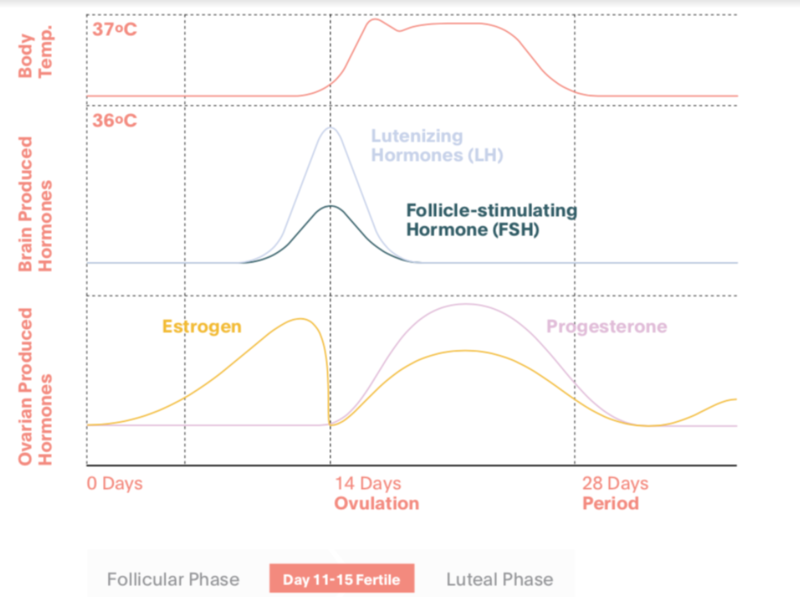
Low progesterone is also a sign of low follicular health or poor egg quality. Giving progesterone as a medication does not address the root problem. While there is no adverse effect of taking progesterone, working on diet and lifestyle changes will benefit you in the long run.
That’s why working on your hormone health for at least 3 months before conceiving will be important in order to work on egg quality, progesterone, and address the root cause issues.
Natural Therapies to Increase Progesterone Levels
- Supplements that Help with Brain Health: Omega 3 fats, Gingko, Rosemary, Maca, Cordyceps – are all great for brain health. We want good signaling from the brain to the ovaries (HPO axis) Trying to get the brain back on track with neuron signaling. Maca, Cordyceps, Lion’s Mane (great for focus), and Chaga medicinal mushrooms.
- Antioxidants play a huge role on the ovaries. Melatonin, lutein foods like beta-carotene, vitamin C, selenium, and zinc can be extremely helpful to the ovaries.
- Vitex / Chaste Tree is a very common herb used to improve both estrogen and progesterone levels. Vitex has been shown to increase LH, and subsequent progesterone levels in women with luteal phase defects. This herb is not necessarily fast acting, but taken every day for 3 months has shown improvements in women in several studies.
Looking for More?
If you’re looking for more support, functional lab testing, and nutrition counseling to help you conceive, let’s schedule a free 30 minute discovery call!

I work with women in their 20s, 30s, and 40s trying to conceive – whether you have PCOS, endometriosis, or unexplained infertility, we will work together to get to the root issue and improve your chances of becoming pregnant.
I hope you learned something from this blog post, and let me know what questions you have below!

The Preconception Playbook
This free playbook provides specific actionable tips to get started on your fertility journey, as well as what to avoid while you're trying to conceive.
Get the free playbook

